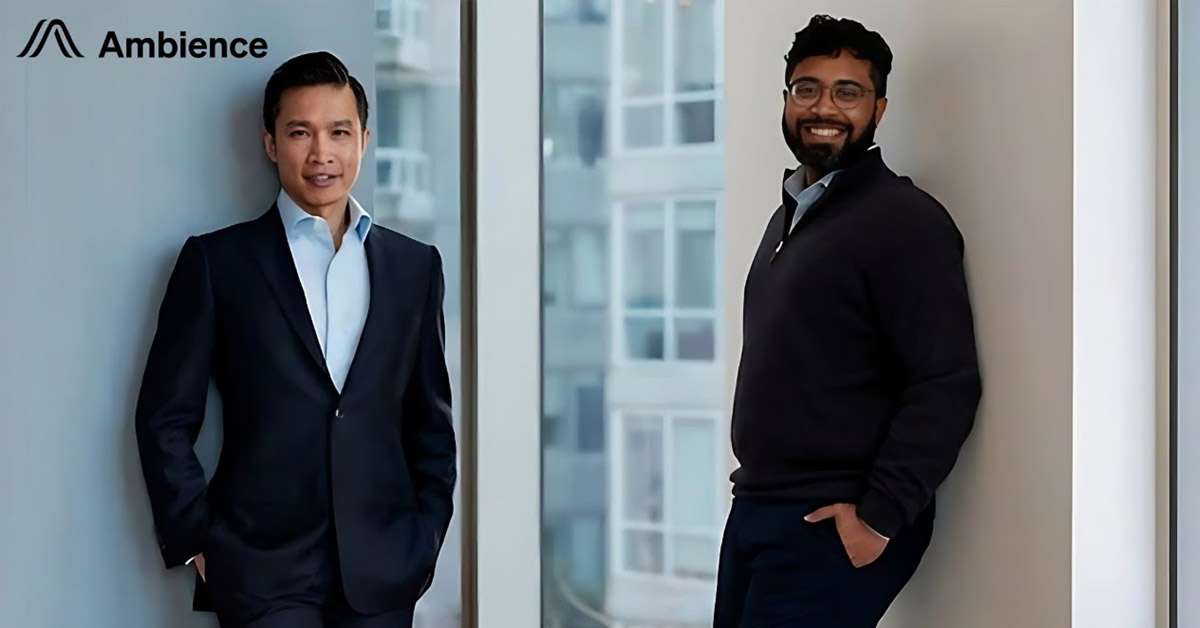San Francisco, U.S.-based comprehensive AI operating system for healthcare organizations, Ambience Healthcare has lately secured $70 million in funding in a round led by OpenAI Startup Fund, and the venture capital firm Kleiner Perkins. The round also saw participation from existing investors Andreessen Horowitz and Optum Ventures.
Commenting on the capital infusion, Brad Lightcap, COO of OpenAI and manager of the OpenAI Startup Fund, said,
“Healthcare is one of AI’s most promising opportunities to create an outsized positive impact on the world. Ambience Healthcare has built an incredible team to focus on providing a complete ecosystem of products that seamlessly fit into the workflow of practitioners, pushing both AI and medicine forward,”
The funding comes as a part of Ambience Healthcare’s aims to accelerate commercial progress, such as deployment with major healthcare organizations such as UCSF, Memorial Hermann Health System, John Muir Health, The Oncology Institute, GI Alliance, Midi Health, and Eventus WholeHealth.
According to the company, a key driver of Ambience’s growth has been the ability to help health systems and large provider groups achieve clear financial ROI as a result of rapid clinician adoption, best-in-class performance, and seamless integrations with leading electronic medical records (EMRs), including Epic, Cerner, eClinicalWorks, Athenahealth, Elation, and AdvancedMD.
The Ambience AI operating system consists of a holistic suite of applications, designed to alleviate clinician burnout, improve overall system efficiency, and enable high-quality care. This includes:
- AutoScribe: A real-time AI medical scribe that generates comprehensive notes across all clinical specialties–including emergency medicine and hospital medicine–and integrates directly with all major EMRs;
- AutoCDI: A point-of-care CDI assistant that analyzes conversations and past EMR context to ensure that ICD-10 codes, CPT codes, and documentation all appropriately support each other, as well as full audit trails for revenue cycle teams.
- AutoRefer: AI software that improves handoffs by composing clinically relevant and well-organized referral letters to specialists for expert consultation and from specialists back to primary care for long-term management;
- AutoAVS: An after-visit summary tool that creates comprehensive educational handouts for patients, families, and caregivers, tailored specifically to each visit, and translated into their language of preference;
- AutoPrep (coming soon): Intelligent pre-charting that equips clinicians with relevant context and suggestions for the visit agenda, along with predictive ‘suspecting’ to unveil potential conditions for screening.
Working in concert as part of a collective ecosystem, these applications are helping health systems reduce documentation time by an average of 78%, improve coding integrity, and achieve at least a 5X return on investment.
“To truly move the needle on quality, cost, and access, we needed a comprehensive platform that covered every single clinical specialty at each touchpoint. From the very first appointment a patient has with one of our clinicians, all the way to the back office operations of how we code and bill. Our team rigorously evaluated and pressure-tested the major solutions on the market. Ambience was the clear choice,” said Dr. Priti Patel, Chief Medical Information Officer at John Muir Health
One of the major challenges for technology in healthcare is that it needs to work well enough to drive widespread end-user adoption, demonstrate measurable time savings, and create a clear financial return on investment.
One complication is the scope of medicine that health systems need to support, which may cover dozens of specialties and subspecialties. Each department has different care models, workflows, and reimbursement frameworks. This poses a serious hurdle for “one-size-fits-all” approaches, which fly blind to these differences. What differentiates Ambience Healthcare is how meticulously it’s been designed for each individual clinical specialty.
For example, in the emergency department, Ambience’s products support non-linear, fast-paced documentation flows, including suspecting, critical care documentation, and consults with paramedics and/or other specialists. Other key technical product features include the ability to:
- Manage simultaneous speakers, multiple languages, and translators
- Operate robustly through intermittent wifi
- Interleave between concurrent visits
- Extract structured data from conversations
By customizing the Ambience AI operating system for each clinical specialty, healthcare systems have seen rapid adoption among clinicians.
“It feels like I have the world’s best medical scribe for Urology, the world’s best CDI expert for Urology, and the world’s best patient experience specialist for Urology at my side for every single visit,” said Richard Long, MD a Urologist at John Muir Health.
Ambience’s platform approach also enables healthcare organizations to break down silos and achieve significant improvements to overall system efficiency. For example, clinical documentation and coding & billing are inextricably linked, yet traditionally these processes are approached separately. This means that internal revenue cycle teams must work off of an incomplete picture of what happened during the visit, often leading to chronic challenges with compliance and financial performance. Ambience’s operating system addresses this structural limitation by leveraging a single shared brain with context across the entire process life cycle, making it easier for healthcare organizations to turn best practice into standard practice.
“Having better CDI at the point of care has resulted in better performance and compliance for our organization. This is increasing confidence in coding among our clinicians, and having access to each audit trail makes it easier for our internal auditing and monitoring team to review. Our team’s feedback goes back into the system so that we can scale improvements across all of our clinicians. Ambience is the only solution on the market to combine scribing with comprehensive CDI support across the entire payer mix, from fee-for-service all the way through full risk value-based care,” said Will Sampson, PhD, Co-Founder and Chief Learning Officer at Eventus WholeHealth
Ambience’s vision is to leverage the same principles to build an entire ecosystem of applications within its operating system. By leveraging a single shared brain, Ambience’s operating system can similarly address the structural inefficiencies of other vital organizational initiatives, such as prior authorization, utilization management, and clinical trial matching. With this most recent round of funding, Ambience Healthcare will focus on accelerating product roadmap, building out dedicated teams for its health system partners, and continuing to push the frontier of the most capable AI foundation models for medicine.
Within the raise, Ambience Healthcare also has set aside open allocation for potential strategic partners. This includes Memorial Hermann, which decided to invest in Ambience after seeing the platform’s impact across the entire spectrum of care, including its ambulatory, emergency department, and hospital inpatient settings.
“As the partner of a physician, I’ve witnessed firsthand my wife burn out from the day-to-day practice of medicine. She had to spend countless hours through nights and weekends on documentation, manual data entry, and other administrative tasks. The market has been screaming for a solution like Ambience, but even with the recent advances in generative AI, this has been an exceedingly challenging problem. Getting the medicine right is hard. Getting the user experience right is hard. Navigating the complicated web of healthcare operations and driving ROI is hard. Ambience’s users and customers–clinicians and healthcare leaders–rave about Ambience, and we couldn’t be more excited to be part of the company’s journey,” said Mamoon Hamid, Partner, Kleiner Perkins.





